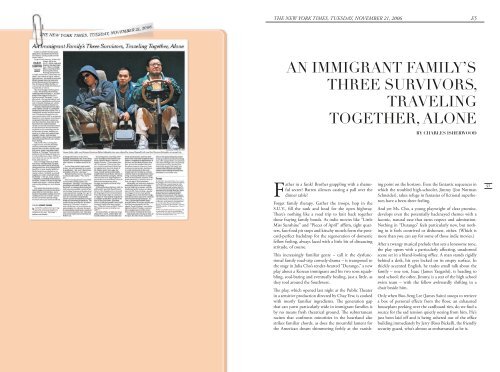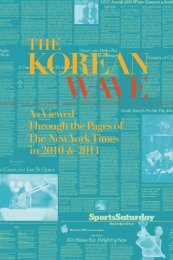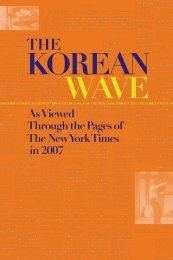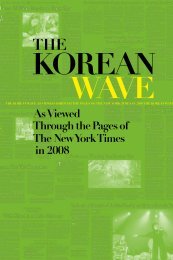The Korean Wave 2006 - Korean Cultural Service
The Korean Wave 2006 - Korean Cultural Service
The Korean Wave 2006 - Korean Cultural Service
You also want an ePaper? Increase the reach of your titles
YUMPU automatically turns print PDFs into web optimized ePapers that Google loves.
<strong>The</strong> New York Times, tuesday, november 21, <strong>2006</strong><br />
e5<br />
An Immigrant Family’s<br />
Three Survivors,<br />
Traveling<br />
Together, Alone<br />
By CHARLES ISHERWOOD<br />
Father in a funk? Brother grappling with a shameful<br />
secret? Barren silences casting a pall over the<br />
dinner table?<br />
Forget family therapy. Gather the troops, hop in the<br />
S.U.V., fill the tank and head for the open highway.<br />
<strong>The</strong>re’s nothing like a road trip to knit back together<br />
those fraying family bonds. As indie movies like “Little<br />
Miss Sunshine” and “Pieces of April” affirm, tight quarters,<br />
fast-food pit stops and kitschy motels form the postcard-perfect<br />
backdrop for the regeneration of domestic<br />
fellow feeling, always laced with a little bit of distancing<br />
attitude, of course.<br />
This increasingly familiar genre – call it the dysfunctional<br />
family road-trip comedy-drama – is transposed to<br />
the stage in Julia Cho’s tender-hearted “Durango,” a new<br />
play about a <strong>Korean</strong> immigrant and his two sons squabbling,<br />
soul-baring and eventually healing, just a little, as<br />
they tool around the Southwest.<br />
<strong>The</strong> play, which opened last night at the Public <strong>The</strong>ater<br />
in a sensitive production directed by Chay Yew, is cooked<br />
with mostly familiar ingredients. <strong>The</strong> generation gap<br />
that can yawn particularly wide in immigrant families is<br />
by no means fresh theatrical ground. <strong>The</strong> subterranean<br />
racism that confronts minorities in the heartland also<br />
strikes familiar chords, as does the mournful lament for<br />
the American dream shimmering feebly at the vanishing<br />
point on the horizon. Even the fantastic sequences in<br />
which the troubled high-schooler, Jimmy (Jon Norman<br />
Schneider), takes refuge in fantasies of fictional superheroes<br />
have a been-there feeling.<br />
And yet Ms. Cho, a young playwright of clear promise,<br />
develops even the potentially hackneyed themes with a<br />
laconic, natural ease that earns respect and admiration.<br />
Nothing in “Durango” feels particularly new, but nothing<br />
in it feels contrived or dishonest, either. (Which is<br />
more than you can say for some of those indie movies.)<br />
After a twangy musical prelude that sets a lonesome tone,<br />
the play opens with a particularly affecting, unadorned<br />
scene set in a bland-looking office. A man stands rigidly<br />
behind a desk, his eyes locked on its empty surface. In<br />
thickly accented English, he trades small talk about the<br />
family – one son, Isaac (James Yaegashi), is heading to<br />
med school; the other, Jimmy, is a star of the high school<br />
swim team – with the fellow awkwardly shifting in a<br />
chair beside him.<br />
Only when Boo-Seng Lee (James Saito) stoops to retrieve<br />
a box of personal effects from the floor, an exhausted<br />
houseplant peeking over the cardboard rim, do we find a<br />
source for the sad tension quietly oozing from him. He’s<br />
just been laid off and is being ushered out of the office<br />
building immediately by Jerry (Ross Bickell), the friendly<br />
security guard, who’s almost as embarrassed as he is.<br />
97





